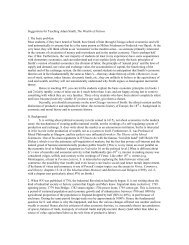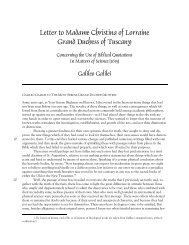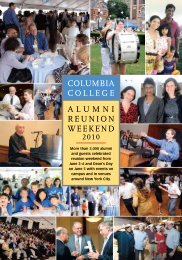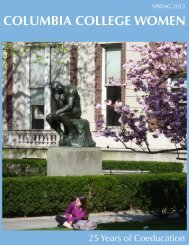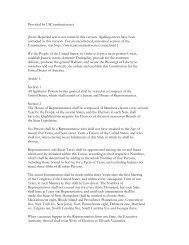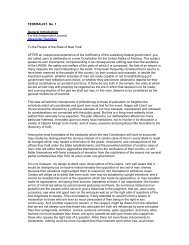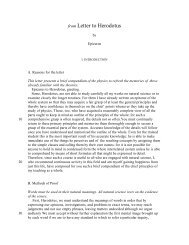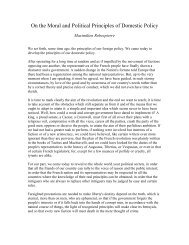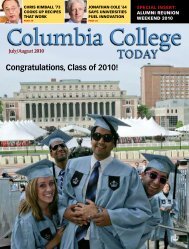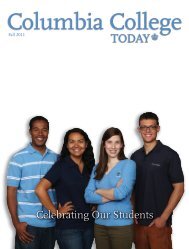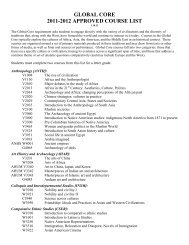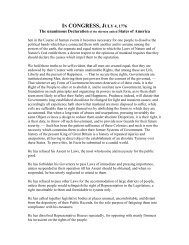Download this issue as a PDF - Columbia College - Columbia ...
Download this issue as a PDF - Columbia College - Columbia ...
Download this issue as a PDF - Columbia College - Columbia ...
Create successful ePaper yourself
Turn your PDF publications into a flip-book with our unique Google optimized e-Paper software.
CLASSIC READINGS, MODERN TECHNOLOGY<br />
COLUMBIA COLLEGE TODAY<br />
COLUMBIA COLLEGE TODAY<br />
additional resources for instructors such <strong>as</strong> secondary readings<br />
and cl<strong>as</strong>sroom materials.<br />
“Each generation brings new tools to the course,” says Mercer.<br />
“Why shouldn’t we use all the tools available to us to make Lit<br />
Hum more engaging for students and e<strong>as</strong>ier for teachers to teach”<br />
The Lit Hum website h<strong>as</strong> another motive: building connections<br />
among the Core courses. “I don’t want the whole to be less<br />
than the sum of its parts,” Mercer says. She envisions links between<br />
the Lit Hum website and its sister websites, say with the<br />
Lit Hum exploration of Montaigne linking to the Art Hum website’s<br />
information on Flemish painter Pieter Bruegel the Elder.<br />
“We want to help students see the connections between the parts<br />
of the Core,” she says.<br />
“The value of technology is to expand the experience, to extend<br />
the interaction that students have in the cl<strong>as</strong>sroom to out of<br />
the cl<strong>as</strong>sroom,” Valentini says. “It is something that expands and<br />
enhances, not replaces.”<br />
These sorts of educational enhancements wouldn’t have<br />
been imaginable 25 years ago, and not just because the<br />
Internet w<strong>as</strong> in its infancy. The growth in the size of the<br />
<strong>College</strong> since the 1980s — along with the large number<br />
of engineers and, now, General Studies students who take Lit Hum<br />
— makes administering the course (indeed, all the Core) more of<br />
a challenge than ever. But the <strong>College</strong>’s commitment to the Core<br />
Curriculum h<strong>as</strong> enabled it to meet the course’s obligations <strong>as</strong> well<br />
<strong>as</strong> implement a host of improvements.<br />
In the late 1980s, the primary administrator for Lit Hum and<br />
CC w<strong>as</strong> a junior administrator who presided over two cramped<br />
offices on the seventh floor of Hamilton Hall that were packed<br />
with filing cabinets stuffed with decades of records and old syllabi,<br />
shelves of Core books and a chronically malfunctioning photocopier.<br />
The course’s instructors had to wedge themselves into<br />
an E<strong>as</strong>t Campus conference room for their weekly staff meetings<br />
with the senior professor who served <strong>as</strong> the course’s chair.<br />
Austin Quigley, dean emeritus of <strong>Columbia</strong> <strong>College</strong> and the<br />
Brander Matthews Professor of Dramatic Literature, made enhancing<br />
and institutionalizing the <strong>College</strong>’s commitment to the<br />
Core Curriculum a central thrust of his administration in the l<strong>as</strong>t<br />
half of the 1990s and the first years of the new century, and Lit<br />
Hum clearly benefited from <strong>this</strong> push. To recognize and support<br />
teaching, he created a set of eight Core chairs for senior faculty<br />
who taught Core courses and also established incentives for junior<br />
faculty who taught in the Core. In addition, the <strong>College</strong> instituted<br />
a Core Lecturers program, so today the Lit Hum and CC<br />
staffs are augmented by a handful of postdoctoral scholars who<br />
receive highly competitive two-year appointments with faculty<br />
rank and teach two sections per semester.<br />
Valentini is working to take <strong>this</strong> to the next level. For the p<strong>as</strong>t<br />
year, he h<strong>as</strong> been making plans to start an endowment for the<br />
“The value of technology is to expand the<br />
experience, to extend the interaction that students<br />
have in and out of the cl<strong>as</strong>sroom.”<br />
Core — a financial foundation that will propel and enrich the<br />
Core’s future. As indicated in the Dean’s Message on page 3 of<br />
<strong>this</strong> <strong>issue</strong>, <strong>this</strong> multi-year campaign is beginning now, and the<br />
first focus of the campaign is to provide the resources to enhance<br />
and enrich the experience of faculty and students in Literature<br />
Humanities and Contemporary Civilization.<br />
Lit Hum, CC and the other Core courses now are housed in the<br />
sleek, burnished Witten Center for the Core Curriculum, made<br />
possible through the generosity of former University Trustee<br />
Richard E. Witten ’75. Located off Hamilton Hall’s main lobby,<br />
the center is a v<strong>as</strong>tly improved resource <strong>as</strong> well <strong>as</strong> a clear testament<br />
of the Core’s central place in the <strong>College</strong>.<br />
According to Associate Dean of Academic Affairs Roosevelt<br />
Montás ’95, ’04 GSAS, the center’s director, the center h<strong>as</strong> become<br />
a vital meeting ground for the Lit Hum faculty. “It is a space<br />
where conversations happen,” he says.<br />
The <strong>College</strong> h<strong>as</strong> sought to expand conversations about the<br />
Core in other ways. The most dramatic h<strong>as</strong> been the Core Scholars<br />
Program, another Mercer initiative, which w<strong>as</strong> launched in<br />
the 2010–11 academic year. Each year the program invites any<br />
student who h<strong>as</strong> completed a Core course to create a Core Reflection.<br />
The program encourages students to analyze, question,<br />
dramatize and interpret materials they encounter in the Core.<br />
Authors of exceptionally creative, well-executed reflections — <strong>as</strong><br />
judged by a student-faculty committee — are honored <strong>as</strong> Core<br />
Scholars, with their reflections posted on the Core Curriculum<br />
website (college.columbia.edu/core/scholars). L<strong>as</strong>t year’s winners<br />
included a “Triptych For Ovid” by Rowan Hisayo Buchanan<br />
’12 and “The Ecst<strong>as</strong>y of Sonya” by Marian Guerra ’14, a reflection<br />
on a scene from Crime and Punishment.<br />
Other efforts to enhance the Lit Hum experience include staging<br />
a cl<strong>as</strong>sical Greek play every fall and having Art Humanities<br />
instructors give guided tours of the Metropolitan Museum of Art<br />
to students.<br />
Despite these enhancements, at its core, Lit Hum remains<br />
about small groups of students reading and discussing books<br />
that have stood the test of time. “The texts remain front and center,”<br />
says Williams.<br />
“The course will thrive <strong>as</strong> long <strong>as</strong> those texts are animated by<br />
bright 18-year-olds arguing about them,” says Yatrakis, adding,<br />
“It’s a wonderful foundation for the work they’re doing for the<br />
following years.”<br />
Mercer puts it more simply. “Lit Hum is awesome,” she says.<br />
Timothy Cross ’98 GSAS, a former CCT <strong>as</strong>sociate editor, is the advancement<br />
communications officer at <strong>Columbia</strong> Engineering. His<br />
history of the Core Curriculum, An O<strong>as</strong>is of Order: The Core<br />
Curriculum at <strong>Columbia</strong> <strong>College</strong> (1995), is available at college.<br />
columbia.edu/core/o<strong>as</strong>is.<br />
Faculty Find Lit Hum<br />
Challenging, Fulfilling<br />
“The course is a marriage of methodologies and<br />
the idiosyncr<strong>as</strong>ies of the individual instructor.”<br />
B y Shira Boss ’93, ’97J, ’98 SIPA<br />
The year-long Literature Humanities seminar is in many ways an exercise<br />
in ambition: Take 22 first-year students through 21 or so foundational<br />
texts of Western literature — by Homer, Plato, Dante, Shakespeare,<br />
Dostoevsky, Woolf — at the rate of about one book per week.<br />
The purpose isn’t only to focus on plot points and comprehension but<br />
also to change how these 17- and 18-year-olds read, think, see the world and, in the years<br />
to come, reflect upon their own life dilemm<strong>as</strong>.<br />
Margo Rosen ’11 GSAS, a Core lecturer, compares<br />
notes with Richard Sacks, an adjunct <strong>as</strong>sociate<br />
professor of English and comparative literature<br />
and one of a corps of mainstays who have taught<br />
Lit Hum for decades.<br />
PHOTO: BRUCE GILBERT<br />
“Lit Hum gives students a couple<br />
of dozen models of how to think about<br />
a problem — the problem of being human,”<br />
says Margo Rosen ’11 GSAS, a<br />
lecturer in Literature Humanities b<strong>as</strong>ed<br />
in the Department of Slavic Languages<br />
and Literatures. “You get Homer’s world<br />
— it’s a great way to start; he works by<br />
repetition and juxtaposition. Plato does<br />
it dialogically. St. Augustine goes inside<br />
the individual — it’s an inward journey<br />
versus an outward journey. Every approach<br />
gives you more tools, and by the<br />
end students have so many ways to deal<br />
with <strong>this</strong> problem of life.”<br />
A crown jewel of the Core Curriculum,<br />
Lit Hum w<strong>as</strong> founded in 1937 <strong>as</strong> Humanities<br />
A. Its goal: to explore major works<br />
of literature <strong>as</strong> a companion course to<br />
the existing Contemporary Civilization,<br />
which features philosophic works. The<br />
syllabus h<strong>as</strong> included The Iliad, Oresteia,<br />
Oedipus the King and Inferno every year<br />
since its debut, with a slightly shifting<br />
c<strong>as</strong>t of other cl<strong>as</strong>sic works. All are chosen<br />
for their enduring relevance to modern<br />
life. “We talk about injustice, rage, family<br />
ties, identity, power — so many <strong>issue</strong>s we<br />
deal with today come up over and over<br />
again in the Lit Hum readings,” says Jo<br />
Ann Cavallo, <strong>as</strong>sociate professor of Italian,<br />
who h<strong>as</strong> taught the course continually<br />
since the early ’90s. “Even though<br />
the texts are very far from us in terms of a<br />
SPRING 2013<br />
22<br />
SPRING 2013<br />
23



